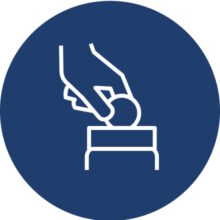West Virginia Dental Program
West Virginia National Hemophilia Foundation
Finding Providers Willing to Work with IBD Patients
People who live with Inheritable Bleeding Disorders (IBD’s) have a higher-than-average amount of difficulty seeing oral health care providers. This project intends to combine different aspects of education, outreach, and financial assistance to help alleviate barriers. (A bit about IBD’s) IBD’s make it hard for blood clots to form. There are 13 clotting factors, and if any of them are deficient or defective, blood clotting is affected. There are several types of IBD’s, and they range in severity. Although they are rare, IBD’s affect about 3 million people in the United States. West Virginia has two Hemophilia Treatment Centers (HTC’s) that currently treat around 350 people, but there are many more who do not visit these centers.
People who suffer from IBD’s have many challenges when it comes to seeking dental care. Providers lack experience in treating these individuals, which leads them to turn away potential patients, even for routine care. Providers who are willing to work with a patient with an IBD can have a hard time finding information on best practices which could result in diminished quality of care.
Even after locating a dentist, paying for treatment can be very expensive. A patient would have to take medications prior to any procedure to ensure blood is clotting properly and must have additional medications on hand for after the procedure. Prices of medications used to treat bleeding disorders are very high, with the average cost of care for a person with severe hemophilia being around $350,000 a year. If this person has an accident, undergoes surgery, or has an inhibitor that works against normal treatments, the cost of care can easily exceed $1 million annually. Since they’re inheritable, families who are affected often have several people needing these costly treatments.
These barriers cause our community members to forgo regular care and preventative treatments. They either get turned down by so many dentists that they give up, or they can’t afford to go. They wait until small problems become unbearable, but by then it’s not a simple fix. Our HTC’s have reported several people in the last few years who were hospitalized over dental problems that could have been prevented with routine care. In an extreme example, a WV resident with severe hemophilia was hospitalized for 87 days due to a dental emergency, amassing a bill of $1.4 million dollars. Our project will create a statewide referral guide of dental providers who have been educated on bleeding disorders, educate our community members on the importance of preventative dental care, and give financial assistance to those who need it. These strategies will eliminate many of the hurdles our community currently faces when seeking dental care and would increase regular, preventative treatment.

